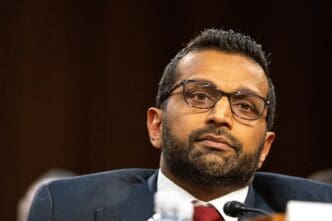Executive Summary
The Story So Far
Why This Matters
Who Thinks What?
During a Senate hearing on Tuesday, former Trump administration official Kash Patel pointedly attributed blame for the initial handling of the Jeffrey Epstein case to Alexander Acosta, who served as US attorney in Florida during the George W. Bush administration. Patel’s testimony, which included characterizing Acosta’s 2006 nonprosecution agreement with Epstein as the “original sin,” signals a potential new political strategy by the Trump administration to deflect criticism regarding the high-profile sex trafficking case.
Patel’s Accusations
Patel, appearing before the Senate Judiciary Committee, twice brought up Acosta unprompted, including in his opening remarks. He asserted that Acosta’s limited searches and the nonprosecution agreement significantly hampered the federal government’s ability to hold Epstein accountable and share crucial information. Patel emphasized his view by stating, “If I were the FBI director, then it wouldn’t have happened.”
Acosta, who was later picked by Trump as labor secretary in his first term, had overseen the nonprosecution agreement with Epstein while serving as US attorney. This deal, struck years before Trump’s presidency, has been widely criticized, particularly since Epstein’s 2019 indictment for sex-trafficking minors and his subsequent death by suicide.
Shift in Administration Stance
Patel’s direct accusation marks a notable shift for the Trump administration, which had previously defended Acosta even after his resignation in 2019 following Epstein’s charges. While a 2020 Justice Department report cited Acosta’s “poor judgment” regarding the deal, Patel’s comments appear to be the first instance of a high-profile Trump administration figure personally casting blame.
Political Implications
The timing of Patel’s remarks is particularly significant as Acosta is scheduled to testify before the House Oversight Committee on Friday. This upcoming appearance will now be scrutinized more closely, as Republicans may adopt Patel’s strategy of making Acosta a central point of blame amid ongoing scrutiny of the Epstein case.
However, this potential strategy presents complexities. Acosta served in Trump’s Cabinet, and the “sweetheart deal” with Epstein was publicly known and an issue even when Trump appointed him labor secretary in 2017. The first Trump administration took no action in the eight months between a comprehensive November 2018 investigation into the deal and Epstein’s charges in July 2019, despite the existing concerns.
Key Takeaways
Patel’s testimony suggests a strategic pivot to reframe responsibility for the Epstein affair. This move could redefine the political narrative surrounding the case, though it also raises questions about the administration’s past defense of Acosta and the implications of this new approach.








